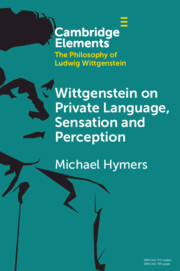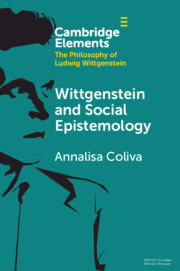Refine search
Actions for selected content:
149 results
Four - A Metaphysics of Magic
- from Part II - Language: Contexts in Question
-
- Book:
- The Life of Form
- Published online:
- 26 February 2026
- Print publication:
- 12 March 2026, pp 130-166
-
- Chapter
- Export citation
Five - Life without Form
- from Part III - Life: Contextual Aporetics
-
- Book:
- The Life of Form
- Published online:
- 26 February 2026
- Print publication:
- 12 March 2026, pp 169-207
-
- Chapter
- Export citation
Conclusion: The Unanalysable Facts of Life
- from Part III - Life: Contextual Aporetics
-
- Book:
- The Life of Form
- Published online:
- 26 February 2026
- Print publication:
- 12 March 2026, pp 244-261
-
- Chapter
- Export citation
Introduction: Forms of Progress
-
- Book:
- The Life of Form
- Published online:
- 26 February 2026
- Print publication:
- 12 March 2026, pp 1-30
-
- Chapter
- Export citation
Two - The Gods of Context
- from Part I - Logic: A Culture of Context
-
- Book:
- The Life of Form
- Published online:
- 26 February 2026
- Print publication:
- 12 March 2026, pp 63-92
-
- Chapter
- Export citation
Three - A Gesture to Anthropology
- from Part II - Language: Contexts in Question
-
- Book:
- The Life of Form
- Published online:
- 26 February 2026
- Print publication:
- 12 March 2026, pp 95-129
-
- Chapter
- Export citation
18 - Concepts, Meaning and Use
-
-
- Book:
- A Philosophical History of the Concept
- Published online:
- 30 January 2026
- Print publication:
- 19 February 2026, pp 365-386
-
- Chapter
- Export citation
Chapter 7 - Emerson’s “Experience” and Plato’s Republic
-
- Book:
- Emerson, the Philosopher of Oppositions
- Published online:
- 20 November 2025
- Print publication:
- 22 January 2026, pp 137-151
-
- Chapter
- Export citation
Chapter 11 - First Words
-
-
- Book:
- Augustine's ‘Confessions'
- Published online:
- 16 December 2025
- Print publication:
- 22 January 2026, pp 189-204
-
- Chapter
- Export citation
Chapter 2 - Varieties of Skepticism in Emerson’s Thought
-
- Book:
- Emerson, the Philosopher of Oppositions
- Published online:
- 20 November 2025
- Print publication:
- 22 January 2026, pp 26-49
-
- Chapter
- Export citation
THE ALGEBRA OF LOGICAL ATOMISM
- Part of
-
- Journal:
- The Review of Symbolic Logic , First View
- Published online by Cambridge University Press:
- 15 January 2026, pp. 1-37
-
- Article
-
- You have access
- Open access
- HTML
- Export citation
Hidden grounds of religious hinge commitments
-
- Journal:
- Religious Studies , First View
- Published online by Cambridge University Press:
- 28 October 2025, pp. 1-18
-
- Article
-
- You have access
- Open access
- HTML
- Export citation
Response to Moore’s ‘Words Don’t Mean, Minds Do!’
-
- Article
-
- You have access
- Open access
- HTML
- Export citation

Wittgenstein on Private Language, Sensation and Perception
-
- Published online:
- 26 September 2025
- Print publication:
- 23 October 2025
-
- Element
- Export citation
WHY SHOULD IDENTITY BE LOGICAL?
- Part of
-
- Journal:
- The Review of Symbolic Logic / Volume 18 / Issue 4 / December 2025
- Published online by Cambridge University Press:
- 17 September 2025, pp. 1168-1191
- Print publication:
- December 2025
-
- Article
- Export citation
Wittgenstein’s methodological naturalism and the location problem in the study of religion
-
- Journal:
- Religious Studies , First View
- Published online by Cambridge University Press:
- 11 September 2025, pp. 1-16
-
- Article
-
- You have access
- Open access
- HTML
- Export citation
The God of falsehoods (or nonsense). Against Lebens’ apophatic theology
-
- Journal:
- Religious Studies , First View
- Published online by Cambridge University Press:
- 22 July 2025, pp. 1-13
-
- Article
-
- You have access
- Open access
- HTML
- Export citation

Wittgenstein and Social Epistemology
-
- Published online:
- 21 July 2025
- Print publication:
- 14 August 2025
-
- Element
- Export citation
Late Wittgenstein’s money
-
- Journal:
- Finance and Society / Volume 11 / Issue 1 / April 2025
- Published online by Cambridge University Press:
- 05 March 2025, pp. 123-130
-
- Article
-
- You have access
- Open access
- HTML
- Export citation
